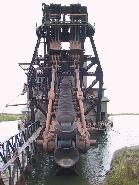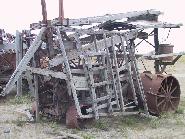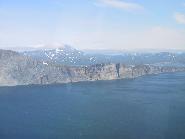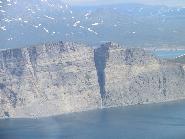More Junkmail from Bob!
Thursday, July 11, 2002Important Stuff.
Computer Fatality
The hard drive on my laptop died a couple of weeks ago, and I lost a few days of email. If you emailed me and I didn't answer, try it again. There were a few "removes" and "subscribes" lost too, so if you tried to sign up or unsign up for Junkmail and it didn't work, try it again. I'll do my best not to lose your email this time.
When I travel I normally leave a copy of my email on the server in case I lose my laptop. Since I hadn't had a hard drive failure for several years, I didn't think it was very likely. This trip I decided to remove the email from the server as I read it, so Mailwasher wouldn't have to go through all the email every time I checked it. Then the computer died, after I read and before I replied to most of the email. Oops!
Now I have a new laptop. It came with Windows XP. I've only had to reinstall the operating system twice and rollback once. Windows XP Reliability! It's a long story, a little boring but pretty entertaining. Maybe I'll write about it sometime. I think I prefer DOS.
Walmart Lindows
Computers are getting faster and cheaper. Still. For $299 you can get an 850 mhz computer from Walmart. It comes with Lindows instead of Windows. Lindows doesn't support as much software as Windows, but you can use it to browse the web, chat, email, word process, and use spreadsheets. It does what most people use a computer for. Since it doesn't run Windows XP like most new computers, it doesn't have to be as fast, doesn't need as much RAM, and doesn't need as big a hard drive.
The fact that Walmart is selling it is significant. If a lot of people start buying this from Walmart and Walmart keeps selling it, it may finally mean some competition for Windows. I just ordered the $499 model to check it out, a P4 1.7 ghz, 256 meg, 40g hard drive. And, naturally, Microsoft has sued Lindows.
What Next?
What's future of computing? Smaller, cheaper, and faster. There are a few technologies that will probably make big changes in computers in a few years.
Compact flash memory or some kind of semiconductor static memory may replace hard drives in small computers in the next 5 or 10 years. Since there are no moving parts, semiconductor storage should eventually be cheaper to manufacture, smaller, and should use less power than an equivalent hard drive. I'm not sure if this is related, but IBM sold their hard drive business last month.
CDs/DVDs (or whatever they turn into) will be a lot smaller and will have a lot higher capacity. Here's an example of some new development:
http://news.com.com/2100-1040-937621.html
Wireless networks will probably be common and secure. My new laptop has a wireless network adapter built-in. I would guess that in a few years people will be able to access the internet over a wireless network wherever you have cell phone service. I realize that's possible today, but it's currently too slow for most applications. Eventually wireless networks will become popular enough that communications companies will offer wideband wireless service all over the place. By 2010, Intel plans to have built-in radio transceivers in their chips.
Computers will get a lot smaller. The standard case is too big for today's desktop computers, and the components should get smaller because the smaller ones are cheaper to make. There should be a standard "tiny tower" case or something like that.
What about laptops? Input and output will be the limiting factors. With a standard keyboard and a display, it will be hard to get much smaller than current laptops. Good voice recognition should eliminate the need for a full-size keyboard. You will be able to tell the computer what to do rather than clicking or typing instructions. There is already voice recognition software available, but it's still a little cumbersome to use. The operating system and applications will have features that make voice input easy, like today's operation systems and applications make it easy to use a mouse. Voice input/output will be a major change to computing.
There are two major problems with today's voice output. First, it doesn't sound normal. This should be easily fixable. Second, it's too slow. I hate it when I am stuck on an automated phone system and have to listen to a bunch of irrelevant stuff that's coming too slow, such as "This call may be monitored in order to ensure that you have to hear this long message before you ever get to talk to a real person. This allows us to weed out anybody who is not extremely serious about talking to us, and that way we can get by with having fewer people to answer the phone."
The speed problem will be harder to fix because it will require users learn to quickly recognize a semi-standard vocabulary of instruction words. The speed the computer says the words will be user-selectable. Real byte-heads will be able to hear and understand the computer at speeds that are incomprehensible to the unpracticed.
People will also learn to speak to the computer quickly in a way recognizable by the computer. This will require a different "accent" of speech, kind of like the different handwriting style required for palmtops. Ordinary speech will work at ordinary speeds, but if you want to talk to your computer at auctioneer speed you'll have to enunciate certain sounds in certain words. It seems unnatural, but it's not nearly as unnatural as something like typing. A pointing device like a mouse or arrow keys will still be required for things like editing text and graphics.
There will be small, high-resolution displays for people who use the computers while walking around and driving. There may also be foldout or rollout displays available for people to set up at a desk. CRT monitors will be replaced by LCD screens.
A lot of people may still choose larger displays and traditional keyboards. After all, the typewriter keyboard has outlasted the typewriter. A single key command is faster and easier than a spoken word. It's also faster than a mouse move-and-click. Even so, most people use the mouse instead of keystrokes in dialog boxes.
The result? Computers the size of today's palmtops will be able to do what my laptop does and more. Voice input and output will be efficient. Wireless internet access will be available almost everywhere. And there will be DWC laws -- Driving While Computing.
There is one important thing to remember about all this... I could be wrong.
On the Back Burner
There's a fire in Pennsylvania. Some people plan to put it put. It is going to take about a year and more than a million dollars. It's an underground coal fire that's getting too close to some gas wells.
http://www.boston.com/dailynews/192/nation/Pennsylvania_makes_another_att:.shtml
Financially Speaking...
The Whitehouse and Congress are preaching about the financial misdeeds of people at Enron, Worldcom, and a dozen other companies. I guess there are lots more financial misdeeds than that around, but the worst I know of are in Congress itself. Here's a good example:
http://www.nytimes.com/2002/06/18/business/18SHIP.html
Congress is spending $187 million to bail out a company making two cruise ships, coincidentally in Mississippi where Senator Trent Lott (Senate Minority Leader) is from, and coincidentally in the shipyard where his dad worked.
I could find about 100 other recent examples, but I won't bother. I think I could also find 100 recent examples of public companies whose management unethically if not illegally takes money from the company.
After I left Learn2, I learned that a board member was getting more than $20,000 per month in consulting fees. The same board member was loaned more than a million dollars by the company to buy Learn2 stock. A smaller loan to directors to buy stock in the company is not too unusual. President Dubbya even borrowed $105,000 once in a similar situation.
But later on, when the stock price went down, the Learn2 director was required to pay back the loan or buy more stock for collateral according to the loan agreement. Instead, the board voted to forget about the $1,000,000+ loan and he never had to pay it back. He got a free million dollars just like that.
I thought that surely this must be illegal. But apparently since it was disclosed in the SEC filings it was legal. People are supposed to read that stuff and find out what management is doing with the cash in their company. Then, after I read about some other dotcoms, I learned that some other companies' management were doing similar things. It's almost like they had given up on ever making a profit, and were trying to extract as much cash from their company as possible before it went under. Unfortunately, they did not share the cash with the other stockholders.
On a bigger scale, one of the Worldcom directors borrowed almost $400,000,000 from the company to buy stock. I'm not sure whether he paid it back.
Linking to NPR
National Public Radio gets some public money to operate. Then they say it's illegal for me to link to their web site like this:
http://news.npr.org/
That seems pretty odd to me, but sometimes the higher-ups in an organization can defy logic.
http://www.wired.com/news/business/0,1367,53355,00.html
Asteroids
In case you missed it, a big space rock came close (depending on how you define "close") to hitting the earth last month. It was about 175,000 miles away, less than 1/3 of the distance to the moon. If it sneaked by you, don't worry. It sneaked by everyone else too. Nobody noticed until 3 days after it had passed by. It was about 300 feet in diameter.
http://www.space.com/scienceastronomy/solarsystem/asteroid_miss_020620.html
Windows Insecurity
Surprise! There is a new security flaw in Windows. And another surprise... Microsoft said it should not have been made public.
http://news.com.com/2100-1001-942980.html?tag=fd_top
Pictures of Today!
Last week I went to Alaska with Cathy and Mike and Mary Jacobs. Here are some pictures...
A gold dredge near Nome, Alaska. It hasn't been used for a while.

This driller has been idle even longer. It was made in Joplin.

Bears, in Katmai National Park. These Alaskan Brown Bears are a variety of Grizzly.






Birds


Big Crack


Bullwinkle

Waterfalls



The Valdez Oil Terminal...

... complete with a supertanker.

(o) All sprites preserved. Any duplication, distribution, or obfuscation of this fine piece of junk is fine with me. If you'd like to sign up yourself or anybody else to receive Junkmail, go to
http://xpda.com/junkmail
If you'd like to read other Junkmails, you can do that there also.
If you don't want me to send you any more of these, please select one or more of the following easy-to-use options:
1. Plug your computer into 440v 3-phase to make it run faster.
2. Get a new email address and keep it secret.
3. Send me an email with "Kangerlussuaq" as the subject.
If you did this a couple of weeks ago and it didn't work, try it again. I had some computer problems and lost some email.
I'm Bob Webster and can usually be found at bob@xpda.com. Have a good day!